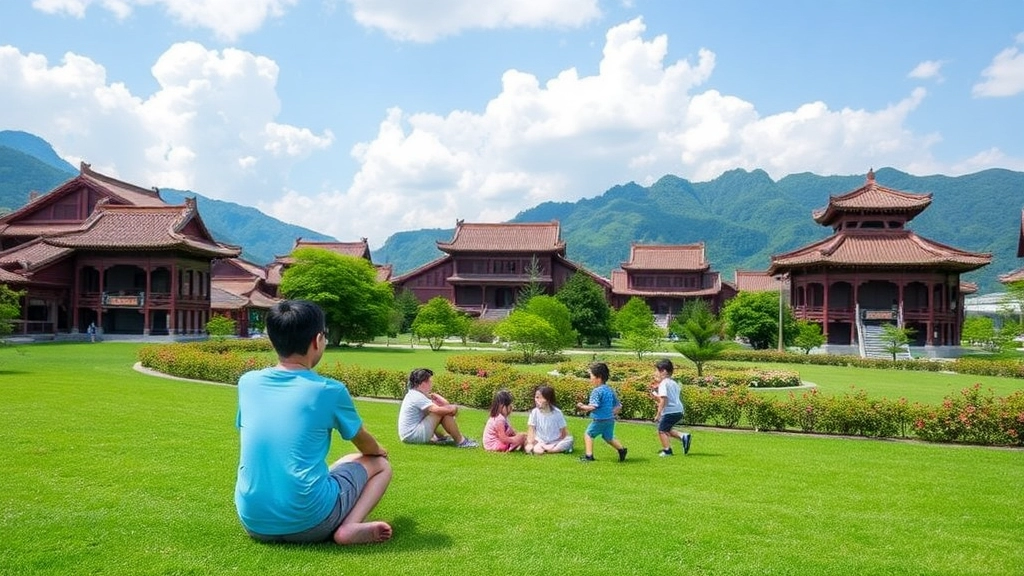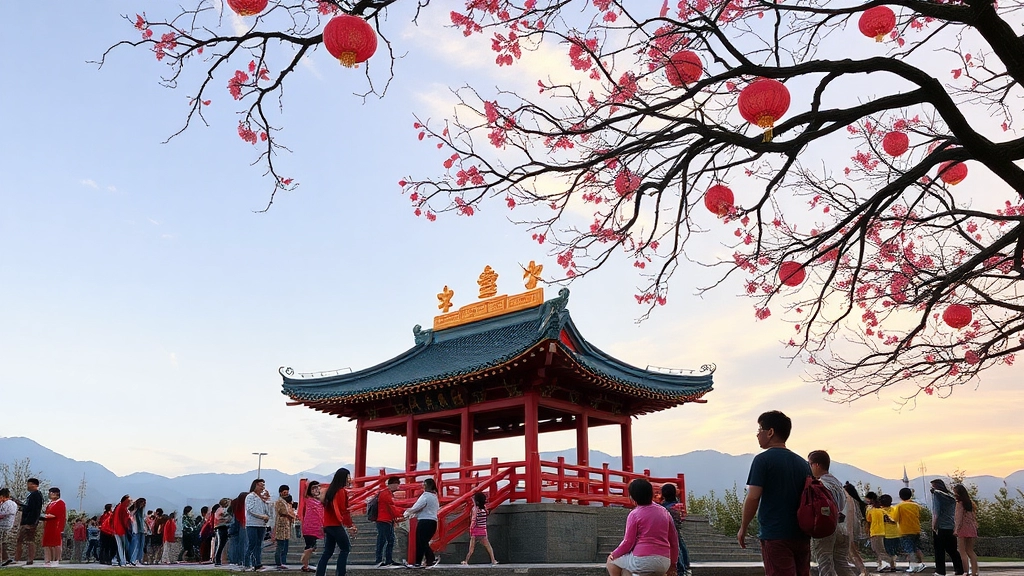Guide to Chinese Summer Camps
Are you considering a Chinese summer camp for your child but unsure where to start? This article is your ultimate guide to navigating the world of Chinese summer camps. From understanding the types of camps available to the myriad benefits they offer, you’ll find everything you need to make an informed decision. We’ll delve into the unique language learning opportunities and cultural immersion activities that make these camps a once-in-a-lifetime experience.
We’ll also explore top destinations, key considerations for parents, and eligibility requirements. Learn how to choose the best camp, understand cost breakdowns, and discover available scholarships. Safety measures and supervision standards are thoroughly discussed to put your mind at ease. Finally, read testimonials from past participants and get step-by-step guidance on the application and registration process. Ready to dive in? Let’s explore the enriching world of Chinese summer camps!
Benefits of Attending a Chinese Summer Camp

Ever wondered if a Chinese summer camp is worth it?
You’re not alone.
Parents and students alike often ask, “What’s in it for us?”
Let’s break it down.
Language Skills on Steroids
Learning Chinese in a classroom is one thing.
Living it is another.
- Full immersion: Speak, read, and write Chinese daily.
- Native speakers: Interact with locals.
- Real-world practice: No textbook can beat that.
Cultural Deep Dive
It’s not just about the language.
- Festivals and traditions: Experience Chinese New Year or the Dragon Boat Festival.
- Cuisine: Taste authentic Chinese food, not just the takeaway version.
- Martial arts: Learn Tai Chi or Kung Fu from the masters.
Personal Growth
It’s more than just fun and games.
- Independence: Being away from home teaches self-reliance.
- Confidence: Navigating a new culture boosts self-esteem.
- Global perspective: Understand the world from a different angle.
Academic Edge
Stand out in school applications.
- Unique experience: Not everyone has studied in China.
- Language proficiency: High demand skill.
- Cultural awareness: A big plus in today’s globalised world.
Lifelong Friendships
Meet people from around the world.
- Diverse friendships: Connect with peers from different backgrounds.
- Networking: Build relationships that could last a lifetime.
Real Talk: Is It Worth It?
Absolutely.
These camps offer a blend of learning and fun that’s hard to beat.
And let’s be honest, it’s a story to tell.
Imagine sharing your summer adventures over coffee with friends.
Internal Links:
Keep it real. Keep it fresh. And dive into a Chinese summer camp experience.
Language Learning Opportunities in Summer Camps
Ever wondered, “Will my kid actually pick up Chinese at a summer camp?” I get it. It’s a valid concern. Let’s break it down.
Why Summer Camps Are Language Goldmines
First off, immersion is the name of the game. When you’re surrounded by a language 24/7, you can’t help but pick it up. Think about itâyou’re not just learning in the classroom; you’re living it. From ordering food to chatting with new friends, every interaction is a lesson.
Structured Learning Meets Real-Life Practice
Camps usually offer a mix of formal classes and casual conversation. Here’s how it typically goes:
- Morning Classes: Focused on grammar, vocabulary, and pronunciation. These are often led by native speakers.
- Afternoon Activities: Think sports, arts, and cultural excursionsâall conducted in Chinese.
- Evening Socials: Movie nights, talent shows, and group games, again, all in Chinese.
This combo of structured learning and real-life practice makes the language stick. You’re not just memorising words; you’re using them.
Tailored Learning Levels
Worried about your kid being thrown into the deep end? Don’t be. Camps usually assess language skills beforehand and place kids in appropriate groups. So whether your child is a total newbie or already knows a few phrases, there’s a spot for them.
Real Stories, Real Gains
Let me share a quick story. I met a parent whose kid attended a Chinese summer camp last year. Initially, the kid was hesitant, barely knowing a word of Chinese. By the end of the camp, they were confidently holding conversations. The parent was blown away. This isn’t a one-off; it’s a common experience.
Benefits Beyond Language
Language learning at these camps isn’t just about speaking and listening. It also:
- Boosts Confidence: Using a new language in real situations builds self-esteem.
- Enhances Cognitive Skills: Learning a new language improves memory and problem-solving abilities.
- Fosters Cultural Appreciation: Understanding a language goes hand-in-hand with appreciating its culture.
If you’re still on the fence, check out our section on Top Summer Camps for Teens to hear real-life stories from other parents and kids.
For more detailed information on camp activities, visit our Top 10 Exciting Summer Camp Activities page.
Cultural Immersion Activities for Students

Ever wondered what makes a Chinese summer camp unforgettable?
It’s the cultural immersion activities.
These camps aren’t just about learning the language; they’re about diving deep into the culture.
Imagine your kid learning calligraphy, trying their hand at traditional Chinese painting, or even mastering the art of Tai Chi.
These experiences are pure gold.
Why Cultural Immersion?
It’s not just about fun.
It’s about understanding.
When students engage in cultural activities, they don’t just learn about China; they live it.
This makes the language stick and the experience memorable.
Top Activities You Can Expect:
- Cooking Classes: Ever tasted authentic dumplings? Now imagine making them. Kids learn to cook traditional dishes, which is both fun and educational.
- Art and Craft Workshops: From paper cutting to making lanterns, these hands-on activities bring creativity into learning.
- Martial Arts Sessions: Think Kung Fu or Tai Chi. It’s not just exercise; it’s a lesson in discipline and focus.
- Cultural Festivals: Students participate in local festivals, experiencing the vibrant traditions firsthand.
Real Stories:
I remember a parent telling me how their kid returned from camp and couldn’t stop talking about the dragon dance they took part in.
It was the highlight of their summer!
Why It Matters:
These activities build a bridge between cultures.
Kids return home with stories, skills, and a newfound appreciation for diversity.
Choosing the Right Camp:
When picking a camp, check out their cultural activities.
Do they offer a variety?
Are they authentic?
This is key.
Top Destinations for Chinese Summer Camps
Alright, let’s get straight to it. If you’re thinking about sending your kids to a Chinese summer camp, you’re probably wondering, “Where’s the best place for them to go?” Well, you’re in luck because I’m about to break it down for you.
Beijing: The Heart of China
Why Beijing?
Beijing is the capital city and a cultural hub. It’s where history meets modernity. Think about itâyour kids can visit the Great Wall, the Forbidden City, and the Summer Palace. Plus, the city’s got some of the best Mandarin language schools. It’s like hitting the jackpot for both education and adventure.
Top Activities in Beijing:
- Historical Tours: Visits to ancient sites like the Great Wall and the Forbidden City.
- Cultural Workshops: Calligraphy, traditional Chinese painting, and martial arts.
- Language Classes: Immersive Mandarin lessons with native speakers.
Shanghai: The Modern Metropolis
Why Shanghai?
Shanghai is the financial centre of China, but it’s not all business. It’s got a vibrant culture and a mix of Western and Eastern influences. Imagine your kids learning Mandarin while exploring the Bund or the futuristic skyline of Pudong. It’s a win-win.
Top Activities in Shanghai:
- City Tours: Explore the Bund, Yu Garden, and the Oriental Pearl Tower.
- Culinary Classes: Learn to make traditional Chinese dishes.
- Tech Visits: Trips to tech hubs and innovation centres.
Chengdu: The Gateway to the West
Why Chengdu?
If your kids are animal lovers, Chengdu is a must. It’s home to the famous Chengdu Research Base of Giant Panda Breeding. But that’s not all; Chengdu offers a slower pace of life and a rich cultural experience. It’s perfect for a more laid-back summer camp.
Top Activities in Chengdu:
- Panda Visits: Get up close and personal with giant pandas.
- Cultural Immersion: Experience traditional Sichuan opera and tea houses.
- Nature Trips: Explore the beautiful Sichuan countryside.
Xi’an: The Ancient Capital
Why Xi’an?
Xi’an is like stepping back in time. It’s the starting point of the Silk Road and home to the Terracotta Army. If your kids are history buffs, they’ll love it here. Plus, the city offers excellent Mandarin programs.
Top Activities in Xi’an:
- Historical Sites: Visit the Terracotta Army and the ancient city wall.
- Cultural Classes: Learn about traditional Chinese crafts and music.
- Language Immersion: Intensive Mandarin courses with local instructors.
Guilin: The Scenic Wonderland
Why Guilin?
Guilin is famous for its stunning landscapesâthink karst mountains and winding rivers. It’s a great place for kids who love the outdoors. The city also offers fantastic language programs and cultural activities.
Top Activities in Guilin:
- Nature Excursions: Boat rides on the Li River and hikes in the countryside.
- Cultural Workshops: Learn traditional Chinese painting and pottery.
- Language Learning: Mandarin lessons in a serene environment.
For more information on planning the perfect summer camp experience, check out our Ultimate Summer Camp Calendar Guide and tips on Summer Camp Costs, Factors, Fees, and Savings Tips.
Key Considerations for Parents

Worried about sending your kid to a Chinese summer camp?
You’re not alone.
Parents often have a ton of questions.
Will my child be safe?
Will they actually learn the language?
What about cultural shock?
Let’s break it down.
Safety First
Safety is the top concern for any parent.
Here’s what you need to look for:
- Accreditation: Make sure the camp is accredited by a reputable organisation.
- Staff-to-Camper Ratio: A lower ratio means more personalised attention.
- Emergency Protocols: Check if the camp has a solid emergency plan.
Learning Opportunities
You want your child to learn Mandarin, right?
Here’s how to ensure they do:
- Qualified Instructors: Look for camps that employ certified language teachers.
- Interactive Lessons: The best camps use games, songs, and activities to make learning fun.
- Immersion: Camps that offer full language immersion are gold.
Cultural Activities
Culture is just as important as language.
What kind of activities does the camp offer?
- Traditional Arts: Think calligraphy, painting, and music.
- Local Tours: Visits to historical sites and museums.
- Cooking Classes: Learning to make Chinese dishes can be a fun and tasty experience.
Location, Location, Location
Where is the camp located?
- Urban vs. Rural: Do you prefer a bustling city or a serene countryside?
- Climate: Consider the weather—hot and humid or cool and breezy?
- Proximity to Healthcare: Always a good idea to have medical facilities nearby.
Cost and Scholarships
Let’s talk money.
- Tuition Fees: Compare different camps to see what fits your budget.
- Additional Costs: Don’t forget about travel, supplies, and spending money.
- Scholarships: Some camps offer financial aid—look into it.
Testimonials
What do other parents say?
- Reviews: Check online reviews and testimonials.
- Word of Mouth: Ask friends or family if they have any recommendations.
- Success Stories: Look for camps that showcase their success stories.
Eligibility and Age Requirements for Campers
Alright, here’s the deal. If you’re wondering whether your kid is the right fit for a Chinese summer camp, I’ve got you covered. Parents always ask, âIs my child old enough? Can they handle being away for that long?â Totally legit concerns. Let’s break it down:
Most Chinese summer camps cater to kids between 7 and 18 years old. That’s a pretty wide range, right? So, the key is finding one that fits your child’s age and maturity level.
Here’s what you need to know about the age groups:
- 7â12 years old: These camps are usually focused on younger kids, so the activities are more playful and structured. Expect lots of games and beginner-level Chinese lessons.
- 13â15 years old: Camps for this age group are more intensive when it comes to language and culture. Kids get more independence but with plenty of supervision.
- 16â18 years old: These camps are designed for teens who want a deep dive into the culture and language. They’ll have more advanced lessons and opportunities to explore the local area.
What if my child has no prior language experience?
Good newsâmost camps don’t expect kids to speak a word of Chinese before joining. Whether your kid is a total beginner or already has some basics down, there’s usually a programme to suit them. In fact, many camps offer different tracks based on skill level, so your child won’t feel out of place.
Are there any other eligibility factors?
You’ll want to check each camp’s specific requirements, but typically:
- Physical fitness: Most camps involve a lot of activities, from hiking to cultural excursions, so your child needs to be in good health.
- Open-mindedness: Kids who enjoy meeting new people and trying different things usually thrive in these environments.
- Some camps require a basic level of independence. If your child has never spent time away from home, a week or two might be a big jump. But if they’ve been to other camps, they’ll likely handle it like a pro.
Bottom line? If your child fits into the age range and is ready for an adventure, they’re probably eligible for a Chinese summer camp. Look at the camp’s specific age group to ensure the best fit.
Cost Breakdown and Scholarships
Alright, let’s get real about the costs of Chinese summer camps. I know money is a big concern for most parents, so let’s break it down and see where you can save some cash and maybe even snag a scholarship.
What’s the Price Tag on a Chinese Summer Camp?
First off, let’s talk numbers. The cost of attending a Chinese summer camp can vary widely. Here’s a rough idea of what you might be looking at:
- Basic Camps: £500 – £1,000 for a week. These typically cover basic accommodation, meals, and some activities.
- Mid-Range Camps: £1,000 – £2,000 for a week. These camps offer better facilities, more activities, and sometimes even excursions.
- Premium Camps: £2,000 – £4,000 for a week. These are top-tier camps with all the bells and whistlesâthink luxury accommodation, gourmet meals, and exclusive experiences.
What Does the Fee Cover?
To give you a clearer picture, here’s a typical breakdown of what’s included in the camp fee:
- Accommodation: Whether it’s a dorm, hotel, or homestay, your lodging is covered.
- Meals: Usually three meals a day, sometimes snacks.
- Language Classes: Mandarin lessons are a staple.
- Cultural Activities: Calligraphy, martial arts, and other cultural immersion activities.
- Excursions: Trips to local attractions or historical sites.
- Materials: Books, workbooks, and other learning materials.
- Supervision: 24/7 supervision to ensure the safety and well-being of campers.
Extra Costs to Keep in Mind
But wait, there’s more! Don’t forget about these additional expenses:
- Airfare: Getting to China isn’t cheap. Budget for round-trip tickets.
- Visa Fees: You’ll need a visa to enter China, and that comes with its own set of costs.
- Insurance: Travel and health insurance are a must.
- Personal Expenses: Souvenirs, extra snacks, and other personal items.
Scholarships and Financial Aid
Now, let’s talk about how you can lighten the financial load. Many camps offer scholarships and financial aid to help families manage the costs. Here’s how you can find them:
- Check the Camp’s Website: Many camps have a section dedicated to scholarships and financial aid.
- Contact the Camp Directly: Sometimes, the best way to get information is to ask. Reach out via email or phone.
- Look for External Scholarships: Organisations like the Confucius Institute often offer scholarships for language and cultural programs.
- Early Bird Discounts: Some camps offer discounts if you register early.
- Group Discounts: If you’re signing up with friends or family, ask if there’s a group rate.
Real Stories from Real Parents
Let’s keep it real with some stories from parents who’ve been there, done that.
- Jane from London: “We were worried about the cost, but the camp offered a partial scholarship that made it affordable. My daughter came back fluent in Mandarin and full of stories.”
- Mark from Manchester: “We budgeted for a mid-range camp and it was worth every penny. The cultural immersion was fantastic, and my son made friends from all over the world.”
For more details on the average cost of summer camps, you can refer to our comprehensive guide on average price of summer camps. Additionally, if you’re looking for tips on finding the right duration for your child’s camp experience, check out our article on how long is summer camp.
Safety Measures and Supervision Standards

Alright, let’s dive into something every parent worries about: safety.
When it comes to sending your kid to a Chinese summer camp, you want to know they’re safe and sound.
I get it.
So, what kind of safety measures and supervision standards are we talking about here?
What Parents Worry About
- Will my child be safe?
- Are the staff trained?
- What if something goes wrong?
These are real concerns, and you deserve real answers.
Safety Measures You Should Expect
- Trained Staff:
- Staff should have first-aid and CPR training.
- Background checks are a must.
- Ratio of staff to campers should be low for personalised attention.
- Secure Facilities:
- Gated premises with 24/7 security.
- Surveillance cameras in common areas.
- Safe sleeping arrangements and clean facilities.
- Health Protocols:
- On-site medical personnel.
- Regular health check-ups.
- Emergency protocols and quick access to hospitals.
Supervision Standards
- Constant Supervision:
- Kids should never be left unsupervised.
- Staff should be present during all activities.
- Activity Monitoring:
- Regular headcounts.
- Check-ins throughout the day.
- Curfews and quiet hours enforced.
- Communication:
- Open lines for parents to contact their kids.
- Regular updates via emails or apps.
- Emergency contact info readily available.
Real Stories
Let me tell you about Sarah, a mum who sent her 12-year-old to a camp last summer.
She was worried sick but was relieved when she got daily updates and photos.
Her kid had a blast, and Sarah felt reassured by the constant communication and visible safety measures.
Why This Matters
Safety isn’t just a checkbox.
It’s peace of mind for you and a great experience for your child.
When choosing a camp, make sure they tick all these boxes.
It’s not just about having fun; it’s about doing it safely.
So, if you’re considering a Chinese summer camp, make safety your top priority.
It’s the foundation of a great camp experience.
Testimonials from Past Participants
When it comes to making a decision about sending your child to a Chinese summer camp, nothing beats hearing from those who’ve already walked the walk. Testimonials from past participants can provide invaluable insights and help you feel more confident in your choice. Let’s dive into some real-life stories and experiences from campers who’ve been there, done that, and got the T-shirt.
Real Questions and Worries
You might be wondering: “Is this camp really worth it?” or “Will my child actually enjoy it and learn something valuable?” These are common concerns, and who better to address them than the campers themselves?
Sarah’s Story: From Nervous to Fluent
Sarah, a 14-year-old from London, was initially nervous about attending a Chinese summer camp. She had zero experience with the language and was worried about fitting in. But by the end of the camp, she was not only speaking basic Mandarin but also had made friends from around the world.
- Language Learning: Intensive classes that made learning fun.
- Cultural Immersion: Hands-on activities like calligraphy and cooking.
- Friendship: Made lifelong friends from different countries.
Tom’s Adventure: More Than Just a Camp
Tom, a 16-year-old from Manchester, attended a summer camp in Beijing. He was keen on exploring Chinese culture and improving his Mandarin skills. He came back with more than just language skills; he had a deeper appreciation for Chinese history and culture.
- Exploration: Visits to historical sites like the Great Wall and Forbidden City.
- Cultural Activities: Participated in traditional festivals and local customs.
- Language Skills: Improved fluency through daily practice and interaction.
Emma’s Experience: A Parent’s Perspective
Emma’s mum, Lisa, was initially sceptical about sending her 13-year-old daughter to a summer camp abroad. Concerns about safety, supervision, and the quality of the programme were at the forefront of her mind. However, after thorough research and reading testimonials, she decided to go for it. Emma returned with glowing reviews and a newfound confidence.
- Safety Measures: High standards of supervision and care.
- Quality Programme: Well-structured activities and qualified instructors.
- Personal Growth: Emma came back more independent and self-assured.
Internal Linking Opportunities
If you’re still on the fence, check out our section on Mandarin Summer Camps: Benefits and How to Choose to ease your worries. Also, our Summer Camp Packing Checklist: Ultimate Guide section might help you understand the essentials better.
Application and Registration Process for Chinese Summer Camps
Worried about getting your kid into a Chinese summer camp?
You’re not alone.
Let’s break it down.
First things first: Why the fuss?
Parents often stress over applications, deadlines, and whether their child will even get in.
But it doesn’t have to be a headache.
Here’s how to make it smooth and straightforward.
Step-by-Step Guide to Applying
- Research Camps Early
Start digging into options.
Check out reviews and talk to parents who’ve been there.
Pro tip: Look for camps that match your child’s interests. - Check Eligibility and Requirements
Age limits? Language skills?
Make sure your kid ticks all the boxes.
Don’t skip this step. It saves time and hassle. - Gather Necessary Documents
You’ll need things like:- Birth certificate
- Medical records
- Previous school reports
Keep these handy.
- Fill Out the Application Form
Most camps have online forms.
Double-check for errors before hitting submit. - Submit on Time
Deadlines are non-negotiable.
Set a reminder so you’re not scrambling last minute. - Pay the Fees
Some camps require a deposit.
Know what you’re paying for upfront.
Tips for a Smooth Registration
- Stay Organised
Use a checklist.
Tick off each step as you go. - Ask Questions
Got doubts?
Reach out to camp organisers.
They’re there to help. - Consider a Backup
Popular camps fill up fast.
Have a plan B just in case.
Common Concerns
What if my child doesn’t get in?
It’s disappointing, but there are plenty of camps out there.
Keep looking.
Worried about costs?
Some camps offer scholarships.
Check their website or give them a call.
For more insights on how to make summer camp affordable, check out our budget-friendly tips and insights.
Frequently Asked Questions about Chinese Summer Camps
What are the benefits of attending a Chinese summer camp?
Chinese summer camps offer a unique blend of language immersion, cultural experiences, personal growth, academic advantages, and the opportunity to form lifelong friendships. Kids get to practice Mandarin daily, interact with native speakers, experience Chinese festivals, learn traditional arts, and develop independence and confidence.
How does full language immersion work in these camps?
Full language immersion means that participants speak, read, and write Chinese daily, often with native speakers. This real-world practice helps solidify language skills more effectively than traditional classroom settings.
What kind of cultural activities are included in a Chinese summer camp?
Cultural activities can include cooking classes, art and craft workshops, martial arts sessions, and participation in local festivals. These activities help students understand and appreciate Chinese culture deeply, making the language learning experience more memorable.
How safe are Chinese summer camps?
Safety is a top priority. Look for camps that are accredited, have a low staff-to-camper ratio, and solid emergency protocols. Facilities should be secure, with trained staff and on-site medical personnel. Regular health check-ups and constant supervision are also essential.
What should parents consider when choosing a Chinese summer camp?
Parents should consider the camp’s safety measures, the qualifications of instructors, the variety and authenticity of cultural activities, the camp’s location, and the overall cost, including any available scholarships. Checking reviews and testimonials can also provide valuable insights.
Are there any academic benefits to attending a Chinese summer camp?
Yes, attending a Chinese summer camp can give students a unique edge in school applications. The experience demonstrates language proficiency and cultural awareness, both of which are highly valued in today’s globalized world.
How do these camps help in personal growth?
Being away from home in a new cultural setting teaches self-reliance and independence. Navigating a different culture boosts confidence and provides a global perspective, helping kids understand the world from a different angle.
Can attending a Chinese summer camp help in making new friends?
Absolutely. These camps bring together kids from various backgrounds, fostering diverse friendships and networking opportunities that can last a lifetime.
What kind of supervision standards are in place at these camps?
Supervision standards include constant monitoring, regular headcounts, check-ins throughout the day, and enforced curfews. Open lines of communication between parents and kids, along with regular updates, are also crucial.
How do I know if a camp is the right fit for my child?
Research the camp’s cultural activities, safety measures, and learning opportunities. Consider the location, climate, and proximity to healthcare facilities. Reading reviews and seeking recommendations can also help in making an informed decision.
References
- Benefits of Chinese Summer Camps
- Chinese Summer Camps: Cultural Immersion Activities
- Summer Camp Safety Tips for Parents

